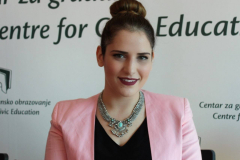Mira Popovic Trstenjak has a master’s degree in administrative law from the Law Faculty of the University of Belgrade. She graduated Civil law at the Law Faculty of the University of Montenegro. She completed the professional exam for work in the state institutions. She attended the Cycle of lectures about Jacques Lacan in the CCE and completed Democracy School organized by the CCE and the Friedrich Ebert Stiftung (FES), FES’s Regional Democracy School and School of Public Policies organized by the Institute Alternative (including advanced levels in the Monitoring and Evaluation of Public Policies). Moreover, she specialized in (anti)discrimination, peace studies, management of projects and grant programmes, principles of vocational education, career advisory, fundamentals of the budgetary system, public procurement transparency, etc. She took part in the International Summer School on European law within Forum Alpbach and Graz International Summer School in media and society. Through study visits in the provision of free legal assistance, she was in London, Dublin and Bucharest. She has specialized also in developing policy briefs and strategic planning via the TRAIN programme, organized by the German Council for International Relations (DGAP). She was an associate during the development of the Functional Analysis of Judiciary in Montenegro within the World Bank project. Additionally, she was a member of working groups for drafting number of legal and strategic texts in the field of education and transparency of work of Government, as well as a member of the IPA Sectoral Monitoring Committee in education. She began her engagement in the CCE via internship and vocational training. During her studies, she was an active member of ELSA Montenegro. She is a lecturer in the CCE’s Human Rights School and used to be a trainer within the certified programme for acquiring key skills to Integrity managers within the Human Resources Management Authority. She authored or co-authored publications Adult education in Montenegro; Three years of violation of the Constitution – who is responsible?; Equal Chances for all media in Montenegro?; Honorary citizenships – awarded to whom and how?; Are free textbooks free?; Academic honour in Montenegrin manner – plagiarism in Montenegro and (lack of) its processing; Science behind closed doors: lack of transparency at UoM and what to do; I have the Right to Know – Report on the transparency of local self-governments on the example of Capital City Podgorica, Kotor and Pljevlja; How (non)transparent are Montenegrin local self-governments?; University walls – Analysis of transparency of work of higher education institutions in Montenegro; Scenarios for Regional Cooperation in the Western Balkans in 2025; Open justice – analysis on the transparency of Montenegrin judiciary; Anti-corruption policies at the local level and what does the X-ray show?; Transparency Index of Montenegrin Municipalities; Financial Alchemy of the University of Montenegro; Long road to justice – Reform of Judiciary in Montenegro; Good neighbor – Montenegro and regional cooperation; Balkanization instead of Europeanization – Fight against corruption in Montenegro; Equal chances for all media in Montenegro – Report for 2018 and 2019. Fluent in English and Italian, with basic knowledge of Spanish and French language.

